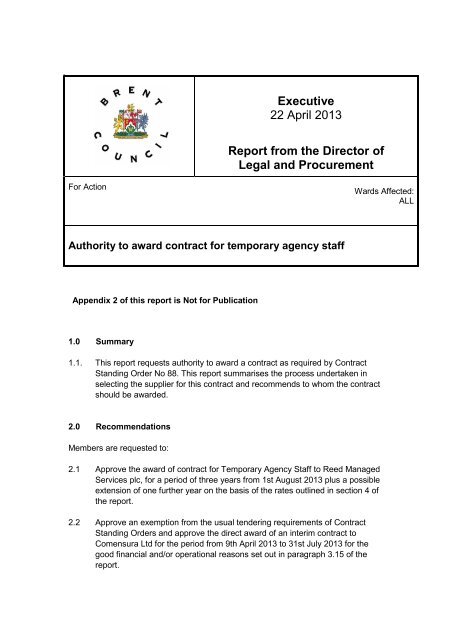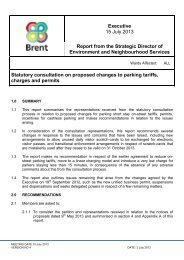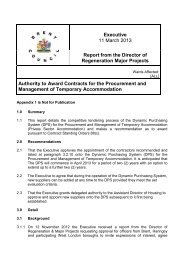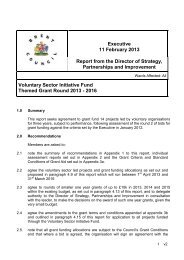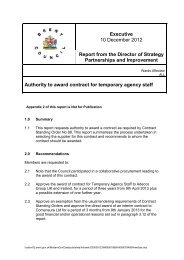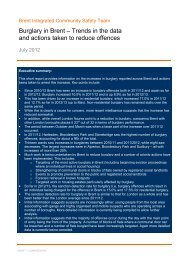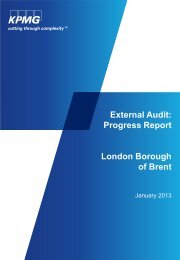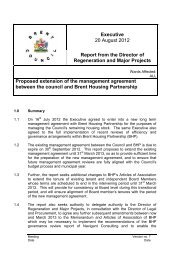Temporary staff contract award PDF 94 KB
Temporary staff contract award PDF 94 KB
Temporary staff contract award PDF 94 KB
- No tags were found...
You also want an ePaper? Increase the reach of your titles
YUMPU automatically turns print PDFs into web optimized ePapers that Google loves.
Executive22 April 2013Report from the Director ofLegal and ProcurementFor ActionWards Affected:ALLAuthority to <strong>award</strong> <strong>contract</strong> for temporary agency <strong>staff</strong>Appendix 2 of this report is Not for Publication1.0 Summary1.1. This report requests authority to <strong>award</strong> a <strong>contract</strong> as required by ContractStanding Order No 88. This report summarises the process undertaken inselecting the supplier for this <strong>contract</strong> and recommends to whom the <strong>contract</strong>should be <strong>award</strong>ed.2.0 RecommendationsMembers are requested to:2.1 Approve the <strong>award</strong> of <strong>contract</strong> for <strong>Temporary</strong> Agency Staff to Reed ManagedServices plc, for a period of three years from 1st August 2013 plus a possibleextension of one further year on the basis of the rates outlined in section 4 ofthe report.2.2 Approve an exemption from the usual tendering requirements of ContractStanding Orders and approve the direct <strong>award</strong> of an interim <strong>contract</strong> toComensura Ltd for the period from 9th April 2013 to 31st July 2013 for thegood financial and/or operational reasons set out in paragraph 3.15 of thereport.
3.0 DetailBackground3.1 The Council has a need for temporary <strong>staff</strong>, to fill vacant posts in the shortterm and on an interim basis, to manage fluctuations in workload and toobtain specialist skills quickly when the need arises.3.2 The Council currently has a <strong>contract</strong> with Comensura for the management oftemporary <strong>staff</strong>. The <strong>contract</strong> is a Vendor Neutral <strong>contract</strong> whereby theservice provider does not provide <strong>staff</strong> directly employed by itself but throughother agencies. The <strong>contract</strong> with Comensura expired in January 2013. The<strong>contract</strong> was called off a framework set up by the Royal Borough ofKensington & Chelsea and the framework was set up in such a way that thecall-off <strong>contract</strong>s have to expire on the same date as the framework.Therefore the Council’s <strong>contract</strong> with Comensura also expired in January2013.3.3 In December 2012 the Executive approved the <strong>award</strong> of a <strong>contract</strong> to AdeccoGroup UK and Ireland and also the direct <strong>award</strong> to Comensura of an interim<strong>contract</strong> for a period of 3 months from 9 th January 2013 to cover the periodleading up to the implementation of the Adecco service. Adecco have nowstated that they are unable to accept the <strong>award</strong> due to a shortage ofresources. They have stated that they will not be in a position to commenceimplementation of any new <strong>contract</strong>s until October 2013 at the earliest. As theCouncil wishes to have a new <strong>contract</strong> in place as soon as possible, analternative procurement route has been followed, as described at 3.7 below.3.4 The Council spent £10.7m on temporary <strong>staff</strong> through the Comensura<strong>contract</strong> in 2011/2012. This includes the gross amount paid to the agencyworker, the fees paid to the employing agency and the fee paid to Comensurafor their service.3.5 Comensura has used technology to take costs out of the supply chainenabling the Council to control spend and centralise invoicing. Comensura’sIT system provides a service at low cost but with limited interaction withCouncil managers and customer service. The <strong>award</strong> proposed in this report isfor a service to be operated on a “Master Vendor” basis (as opposed toVendor Neutral), whereby the supplier directly employs some categories ofagency <strong>staff</strong> and <strong>contract</strong>s with other agencies for the remainder.3.6 The advantages of the master vendor relationship over the current vendorneutral one are:• reduced unit cost to reflect the vendor’s share of the business• single invoice per month if required• increased robustness of management information• better candidate matching• reduced wastage/improved productivity• standardisation of feesThe selection process
3.7 It is proposed that a direct appointment is made of a supplier on a frameworkestablished by the Eastern Shires Purchasing Organisation.The framework3.8 The Eastern Shires Purchasing Organisation (ESPO) is a local authoritypurchasing consortium, jointly operated by the county councils ofCambridgeshire, Leicestershire, Lincolnshire, Norfolk and Warwickshire andthe unitary authorities of Leicester and Peterborough City Councils.The Local Government Professional Services Group (LGPSG) is astakeholder group representing and supporting local authorities acrossEngland in delivering savings from the procurement of professional services,and in 2010 it commissioned ESPO to procure a framework for ManagedService Providers of <strong>Temporary</strong> Agency Resources (MSTAR).The procurement process adopted by ESPO for the LGPSG was based uponthe Open (one-stage) tendering procedure under the EU rules. Although theservices are part B, an OJEU <strong>contract</strong> notice was placed. This indicated thatthe framework was a national one which would be open for use by all localauthorities as well as some other public sector bodies. It was advertised as a4-year framework agreement.Six different sub-lots were tendered, and each sub-lot was evaluatedseparately. The evaluation involved two stages, qualifying and <strong>award</strong>; thoseoffers that met the qualifying criteria were then scored against the <strong>award</strong>criteria.The qualifying criteria included assessment of the following: compliance ofbid, financial standing, insurance levels, experience and references, quality,environmental and health & safety procedures, business continuity plans,compliance with <strong>contract</strong> regulations and compliance with the terms andconditions.The <strong>award</strong> criteria were divided into two areas; service delivery and price andthe specific weightings used were as follows:Service Delivery: 40% Price 60%A position on the framework was <strong>award</strong>ed to the six highest scoring Suppliersin each of the sub-lots. An OJEU <strong>award</strong> notice was then placed confirmingframework commencement on 11 th April 2011 for 4 years.3.9 The rules of the framework allow a direct <strong>award</strong> to be made to a supplier, oncondition that the supplier selection is made based on price evaluation only. Adetailed calculation of the projected costs with each of the suppliers had beenundertaken, and the lowest priced supplier of the Brent requirement, based on2011/12 usage, is Reed Managed Services plc.3.10 The cost projections have taken into account the reduction in booking fees,which are not payable for those <strong>staff</strong> who are directly employed by a MasterVendor. This has been based on an assumption that 60% of temporary <strong>staff</strong>will employed directly by Reed. This percentage is a model that is included inthe framework terms.
3.11 The details of the price calculations for the Brent service are contained inAppendix 1. Only five of the six organisations on the framework are included,Adecco were not included in this exercise as they have stated that they do nothave sufficient resources for implementation.3.12 There will be a charge by ESPO to the Council of using the MSTARframework <strong>contract</strong>. This charge is 2p per agency hour purchased, and isadded to the supplier’s hourly MSP fee. The total effect of this 2p charge isestimated at £7,718.00 per annum, based on historical agency <strong>staff</strong> usage.3.13 There are opportunities for making savings during the term of the <strong>contract</strong>,and in particular during the first year. These are:• Demand challenge: Only essential temporary <strong>staff</strong> are actually takenon. The supplier will work with the Council to test the actual need foreach temporary assignment.• Tenure challenge: The supplier will conduct regular reviews of longterm assignments to ensure that the <strong>staff</strong> are not overlooked andsimply left in an assignment unchallenged.• Tenure discount challenge: The supplier will work closely with theirsupply chain to identify areas for further agency margin discountsonce their overhead costs have been recovered, allowing lowermargins to be earned for longer tenure workers.The supplier is incentivised to make these savings by a mechanism in the<strong>contract</strong>, which allows them to keep 10% of any savings made during the firstyear of the <strong>contract</strong>. This “gainshare” arrangement is an option included in theframework.3.14 The arrangement with Reed will enable improved service levels will beachieved through the provision of on-site recruitment support.3.15 The current <strong>contract</strong> with Comensura expires on 8 th April 2013, and this reportis recommending they be <strong>award</strong>ed an interim <strong>contract</strong> until 31 st July 2013based on the same terms and conditions as the current arrangement. This isin order to allow sufficient time for Reed to carry out the implementation of thenew service and migrate current temporary <strong>staff</strong> to the new <strong>contract</strong>, and inparticular to give sufficient time for negotiations with existing temporary <strong>staff</strong>employing agencies, who will be required to agree terms with Reed.4.0 Financial Implications4.1 The Council’s Contract Standing Orders state that <strong>contract</strong>s for supplies andservices exceeding £500k or works <strong>contract</strong>s exceeding £1million shall bereferred to the Executive for approval of the <strong>award</strong> of the <strong>contract</strong>.4.2 The estimated value of this <strong>contract</strong> is £11m per annum including the pay ofthe temporary <strong>staff</strong>, and will vary depending on the quantity of agencyworkers.4.3 The fee element of the current <strong>contract</strong> was £735,282.56 in 2011/12. This
eflects the fee paid to the employing agency and the fee for the Comensuraservice. The projected costs for the Reed Service are £741,752.64 perannum, based on 2011/12 agency <strong>staff</strong> usage. The MSTAR usage feereferred to in 3.12 above is estimated at £7,718.00, giving a total projectedcost of £749,470.64, representing an overall increase of £14,188.08 or 1.9%on the price currently paid.4.4 There are opportunities to make savings during the term of the <strong>contract</strong>, asdescribed in 3.13 above. Reed will be incentivised to identify savings by amechanism in the <strong>contract</strong> which allows them a 10% share of those savingsduring the first <strong>contract</strong> year.4.5 The cost of the <strong>contract</strong> will be funded from those service areas that useagency workers.4.6 There are no other associated costs of the <strong>contract</strong>.5.0 Legal Implications5.1 For the purpose of Contract Standing Orders, the value of this <strong>contract</strong> is theestimated value that will be paid to Reed for its own fees and those of theother agencies it uses over the lifetime of the <strong>contract</strong>. It does not include thepay to the temporary workers which are under separate <strong>contract</strong>s and whichare exempt from Contract Standing Orders by virtue of a specific exception inparagraph 83(a) of Contract Standing Orders.5.2 The estimated value of this <strong>contract</strong> over its lifetime is higher than the EUthreshold for Services. However these services are classified as part Bservices under the Regulations and so the <strong>award</strong> of the <strong>contract</strong> is notgoverned by the Public Procurement Regulations apart from generalrequirements to be fair, transparent and non-discriminatory. The <strong>award</strong> issubject to the Council’s own Standing Orders in respect of High Value<strong>contract</strong>s and Financial Regulations.5.3 Where a <strong>contract</strong> proposed for <strong>award</strong> has been procured by calling off aframework set up by another body, there is no requirement under ContractStanding Orders for the submission of a pre-tender report to the Executive.Instead the proposal to use the particular framework has to be approved bythe Chief Officer, including confirmation that a budget is available, togetherwith confirmation from the Director of Legal and Procurement that use of theframework is legally permissible (SO 87(d)).For the proposed use of this framework, Chief Officer approval had beengiven and the Director of Legal and Procurement has already confirmedinformally that use of the framework is legally permissible.
5.4 There is no requirement for a standstill period so the <strong>contract</strong> can be <strong>award</strong>edto Reed on expiry of the call-in period.5.5 This report is also requesting approval for an exemption from the usualtendering requirements of Contract Standing Order 84f for Medium ValueContracts, in order to allow a direct <strong>award</strong> of an interim <strong>contract</strong> to the currentprovider of temporary <strong>staff</strong> management services. The Executive has thepower to do this by virtue of Contract Standing Order 84a, provided thatMembers are satisfied that there are good operational and/or financialreasons for doing so. As the service is part B under the EU publicprocurement regime, then there is no breach of EU tendering requirements inrelation to such a direct <strong>award</strong>, though the general duties of fairness,transparency and non-discrimination still apply.6.0 Diversity Implications6.1 The proposals in this report have been subject to screening and officersbelieve that there are no diversity implications.7.0 Staffing Implications7.1. There will always be a need for specialist skills and additional capacity attimes of change and the council can provide for this need at the best ratesusing the approach outlined in this paper.7.2. Improved <strong>contract</strong> management of non-permanent <strong>staff</strong>ing arrangements willhelp to ensure that vacant posts are filled sooner so that the council has areduced reliance on non-permanent <strong>staff</strong>.Contact OfficersFiona LeddenDirector of Legal and Procurement


